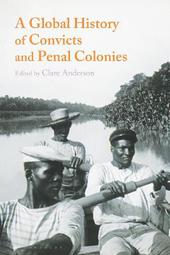
|
A Global History of Convicts and Penal Colonies
Hardback
Main Details
| Title |
A Global History of Convicts and Penal Colonies
|
| Authors and Contributors |
Edited by Clare Anderson
|
| Physical Properties |
| Format:Hardback | | Pages:408 | | Dimensions(mm): Height 234,Width 156 |
|
| Category/Genre | World history |
|---|
| ISBN/Barcode |
9781350000674
|
| Classifications | Dewey:365.34 |
|---|
| Audience | | Tertiary Education (US: College) | |
|---|
| Illustrations |
30 bw illus
|
|
Publishing Details |
| Publisher |
Bloomsbury Publishing PLC
|
| Imprint |
Bloomsbury Academic
|
| Publication Date |
17 May 2018 |
| Publication Country |
United Kingdom
|
Description
This book is available as open access through the Bloomsbury Open Access programme and is available on www.bloomsburycollections.com. It is funded by the University of Leicester. Between 1415, when the Portuguese first used convicts for colonization purposes in the North African enclave of Ceuta, to the 1960s and the dissolution of Stalin's gulags, global powers including the Spanish, Dutch, Portuguese, British, Russians, Chinese and Japanese transported millions of convicts to forts, penal settlements and penal colonies all over the world. A Global History of Convicts and Penal Colonies builds on specific regional archives and literatures to write the first global history of penal transportation. The essays explore the idea of penal transportation as an engine of global change, in which political repression and forced labour combined to produce long-term impacts on economy, society and identity. They investigate the varied and interconnected routes convicts took to penal sites across the world, and the relationship of these convict flows to other forms of punishment, unfree labour, military service and indigenous incarceration. They also explore the lived worlds of convicts, including work, culture, religion and intimacy, and convict experience and agency.
Author Biography
Clare Anderson is Professor of History at the University of Leicester, UK. She is a member of the British Academy Area Panel for South Asia and on the Advisory Council of the Institute for Historical Research and is currently editor of the Journal of Colonialism and Colonial History. Her recent publications include Subaltern Lives: Biographies of Colonialism in the Indian Ocean World, 1790-1920 (2012) and Mutiny and Maritime Radicalism in the Age of Revolution: A Global Survey (2013).
ReviewsAnderson's work is a welcome addition to a field which merits more investment ... [It] introduces contemporary theoretical concerns, as well as the concerns of contemporary activists to historical topics. * EuropeNow * In documenting the magnitude, diversity and near-ubiquity of convict transportation and penal colonies across five centuries, Anderson and her collaborators transform the marginalised and fragmented history of the global convict into a story central to European expansion, labour control and enduring empire. Drawing on a wealth of archival material and an exceptional range of national and imperial perspectives, this is an outstanding contribution to the critical literature on carceral geographies and prison histories. It is also global history at its most innovative, insightful and combative. * David Arnold, Emeritus Professor of History, University of Warwick, UK * In this stunning account of convict circuitry across the globe, Clare Anderson and contributors prove without a shadow of a doubt that convicts made the modern world. Tracking their movements and their carceral traces across nations, empires and many dispersed spaces in between, the authors map a remarkable range of social, economic, cultural, labor, gendered and racial histories. In the process, they model a transnational method that follows the archive while recognizing how distorted it is by the way that penal regimes worked. Students of global history will turn to this book as an example of world history from below for many years to come. * Antoinette Burton, Professor of History and Bastian Professor of Global and Transnational Studies, University of Illinois, USA * There is much in this volume to savour. It represents a significant addition to a growing corpus of work...on the importance of convict labour in the histories of both punishment and unfree labour. And these volumes demonstrate admirably the importance of taking a global and transnational approach to these questions. -- Stephen Garton * Australian Historical Studies *
|